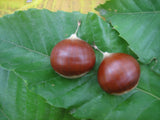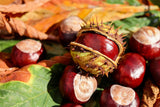The size of the chestnuts affects how quickly they cure (slightly dry) especially early in the season. When chestnuts cure, they sweeten, thus many customers assume smaller is sweeter. Later in the season, all sizes will taste the same. Jumbo nuts are easier to handle and peel, so are preferred if you are preparing them for a recipe. Small and medium nuts roast more evenly and are fun for a group when snacking on roasted nuts.
Size in any one year is a function of the species, the rainfall and specific cultivars. Different chestnut species have different size ranges. The European, Japanese, and Korean imports tend to be larger nuts. The Chinese (Castanea Mollissima) and Chinese American hybrid chestnuts, which we grow, are in the middle size range (and we think sweeter). The American chestnut (Castanea dentate) was supposed to be very small and sweet. Because a fresh chestnut is about 45% water when freshly ripe, rainfall in the late season makes nuts significantly larger overall. Because we have many seedling trees in addition to grafted varieties, and because we pick up all nuts, our sizes vary from small to jumbo. Our sizer, which we have used for 15 years, drops the nuts into the appropriate tray. Some years we have more mediums, other years, more large. All are good.
Our organic, fresh chestnuts are not chemically treated (such as with bleach). A bit of mold on the inedible shell is common and is not a defect. If you notice mold after shipment or in your refrigerator, simply wash the nuts (you may add some vinegar to the water to inhibit further mold), dry them and store them in a vented bag in your refrigerator.
Chestnuts are nutritionally a complete protein and very low in fat. 68 calories per ounce. They even have Vitamin C. We have had some customers tell us that chestnuts are used as a winter preventative against colds (vitamin C, zinc, potassium—sound like some over the counter remedy?!) For a full list of the nutrients, see the USDA source.

 Horse chestnuts and buckeyes are of the genus Aesculus and are not related to edible chestnuts, genus Castanea. Horse chestnuts and buckeyes are mildly toxic. Edible chestnuts have a point and a little tassel opposite the light colored base, where horse chestnuts are smooth and round.
Horse chestnuts and buckeyes are of the genus Aesculus and are not related to edible chestnuts, genus Castanea. Horse chestnuts and buckeyes are mildly toxic. Edible chestnuts have a point and a little tassel opposite the light colored base, where horse chestnuts are smooth and round.
There are number of good websites which provide information about growing chestnuts. We do not sell chestnut trees and don’t prepare our chestnuts as seeds for planting. We recommend surveying the expert advice from universities and joining organizations like the Chestnut Growers of America, The American Chestnut Foundation, and the Northern Nut Growers to learn from other growers.
We do have some observations for you to keep in mind:
Be aware of the Asian chestnut gall wasp invasion. This little bad-news interloper came into North America inside buds on chestnut cuttings, where they are protected from pesticides, and are spread by infected nursery stock. Avoid buying nursery stock from states where gall wasps have been found (most nurseries east of the Mississippi). See: https://extension2.missouri.edu/pa100. Also, be responsible to gather your fallen chestnuts to avoid proliferation of chestnut weevils in areas now free of this pest.
Good university-based information on growing chestnuts can be found at: http://extension.missouri.edu/explorepdf/agguides/agroforestry/af1007.pdf, and http://www.canr.msu.edu/chestnuts/
"Let me say that, after trying many other chestnuts from different farms, your chestnuts are by far THE BEST chestnuts!"
Ibrahim, New Haven, Connecticut